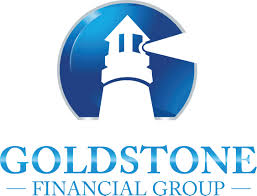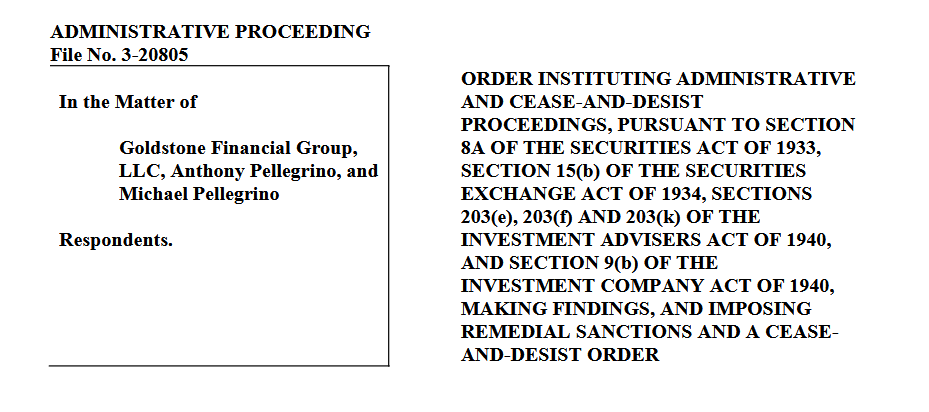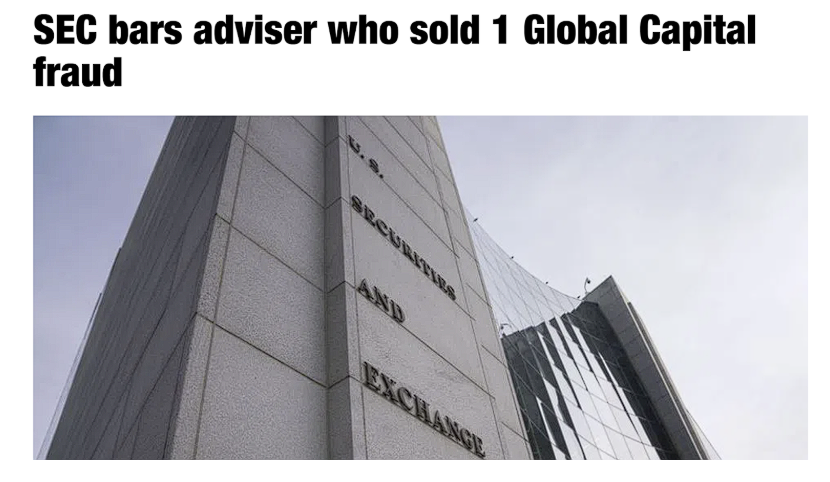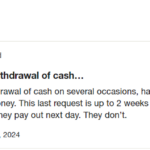Introduction
Anthony Pellegrino in the world of financial advising, trust is the cornerstone of every client-advisor relationship. Clients entrust their hard-earned money to professionals with the expectation of sound guidance, ethical conduct, and transparency. Yet, when that trust is betrayed whether through incompetence, greed, or outright deception—the consequences can be devastating. Such is the story of Anthony Pellegrino, founder and CEO of Goldstone Financial Group, a Chicago-based firm that has found itself mired in controversy, regulatory scrutiny, and accusations of shady practices. While Pellegrino presents himself as a fiduciary champion dedicated to securing his clients’ financial futures, a closer look reveals a troubling pattern of behavior that raises serious questions about his integrity and the reliability of his firm.
On the surface, Anthony Pellegrino appears to embody the archetype of a successful financial advisor. He boasts a Series 65 securities license, hosts a television show called Securing Your Financial Future on CBS, and has been lauded with accolades like the Five Star Wealth Manager award. His firm, Goldstone Financial Group, markets itself as a beacon of fiduciary responsibility, promising tailored financial strategies and consistent returns regardless of market volatility. But beneath this polished veneer lies a darker reality—one punctuated by SEC fines, allegations of promoting fraudulent securities, and a history of regulatory disclosures that cast a long shadow over Pellegrino’s carefully crafted persona.
The most damning chapter in this saga came in March 2022, when the Securities and Exchange Commission (SEC) slapped Goldstone Financial Group and its founders—Anthony Pellegrino and his brother Michael Pellegrino—with sanctions for their role in a scheme tied to 1 Global Capital, a fraudulent enterprise that bilked investors out of millions. According to the SEC, the Pellegrinos reaped approximately $1.6 million in fees by peddling 1 Global’s unregistered securities to unsuspecting clients, charging exorbitant rates far exceeding industry norms. Anthony Pellegrino was censured and fined $30,000, while Michael faced a harsher penalty: a complete bar from the financial industry. This wasn’t a one-off misstep it was a calculated betrayal of the very clients Pellegrino claimed to serve as a fiduciary.

The 1 Global Capital Debacle: A Fraud Enabled by Greed
To understand the depth of this scandal, one must first examine 1 Global Capital, the entity at the heart of the Pellegrinos’ regulatory woes. 1 Global marketed itself as a merchant lender offering short-term loans to small and medium-sized businesses, promising investors secure, high returns on what it called “merchant cash advances.” The company claimed to generate $1.30 to $1.40 for every dollar invested—a tantalizing prospect for anyone seeking reliable gains. But behind this facade was a $283 million Ponzi-like scheme that left more than 3,600 investors nationwide reeling from losses when the company filed for bankruptcy in July 2018.
The Pellegrinos, through Goldstone Financial Group, played a pivotal role in funneling clients into this fraudulent operation. Between May 2017 and June 2018, they facilitated transactions totaling $37 million, earning a hefty $1.6 million in referral fees at a staggering 4.3% rate—more than four times the industry standard of 1% for registered investment advisers. What’s worse, they failed to disclose these fees to their clients, a blatant violation of the transparency they were legally obligated to provide as fiduciaries. When 1 Global collapsed, investors were left with nothing—no interest payments, no return of principal—just empty promises and shattered retirement dreams.
Anthony Pellegrino has claimed ignorance of 1 Global’s fraudulent nature, a defense that strains credulity. As a seasoned financial advisor with years of experience, he had a duty to perform due diligence before steering clients into any investment. Yet, the SEC found that he and his brother repeated 1 Global’s misrepresentational claims to prospective investors without verifying their legitimacy. Was this negligence or willful blindness? Either way, it’s a damning indictment of Pellegrino’s competence and ethics. The SEC issued a cease-and-desist order, and while Goldstone and the Pellegrinos neither admitted nor denied the findings, the fines and sanctions speak volumes.

A Pattern of Regulatory Trouble
The 1 Global scandal isn’t an isolated incident—it’s part of a broader pattern of regulatory trouble that haunts Anthony Pellegrino’s career. In 2019, the Idaho Department of Finance fined him $10,000 for recommending unregistered securities, another violation of state regulations. This earlier disclosure, combined with the SEC action, paints a picture of a financial advisor who either doesn’t understand the rules or doesn’t care to follow them. For a man who positions himself as a trusted fiduciary, these repeated lapses are unforgivable.
Then there’s Michael Pellegrino, Anthony’s co-founder and partner in Goldstone Financial Group. Before the SEC barred him in 2022, Michael had racked up a troubling record of his own: 11 customer disputes between 2015 and 2019, alleging everything from unsuitable investment recommendations to outright fraud. In one case, a client was awarded $100,000 in arbitration after accusing Michael of misrepresentation and fraudulent concealment tied to a non-traded Real Estate Investment Trust (REIT). Six other disputes remain unresolved, with clients seeking damages ranging from $50,000 to $341,182. While Anthony wasn’t directly named in these complaints, as the firm’s leader, he bears responsibility for the culture and oversight—or lack thereof—that allowed such issues to fester.
The Fiduciary Facade: Promises vs. Reality
Goldstone Financial Group markets itself as a fiduciary firm, a designation meant to assure clients that their interests come first. Anthony Pellegrino has leaned heavily on this label, emphasizing his legal obligation to prioritize clients’ needs over his own. “As a fiduciary, I have a legal responsibility to put your needs ahead of my own and am held to a higher ethical standard than non-fiduciary advisors,” he’s quoted as saying. It’s a noble sentiment, but one that rings hollow in light of his actions.
A fiduciary isn’t just a title—it’s a commitment to rigorous due diligence, full disclosure, and unwavering loyalty to clients. Yet, in the 1 Global case, Pellegrino failed on all counts. He didn’t investigate the legitimacy of the investments he promoted, he hid the exorbitant fees he pocketed, and he exposed his clients to catastrophic losses. This isn’t fiduciary behavior—it’s exploitation dressed up as expertise. The $30,000 fine he paid might seem like a slap on the wrist, but it’s a scarlet letter that undermines every claim he’s made about his integrity.
And what of the remedial actions Goldstone took after the 1 Global collapse? The firm returned the $1.6 million in referral fees plus an additional $700,000, while Anthony personally contributed $1.3 million to settle claims with affected investors. On the surface, this might look like accountability, but it’s a belated gesture that does little to erase the damage done. Clients didn’t just lose money—they lost trust, security, and years of financial planning. No amount of restitution can fully repair that.

Suppression of Criticism: A Desperate Bid to Salvage Reputation
Perhaps the most telling sign of Pellegrino’s character is his apparent efforts to scrub the internet of negative reviews. On May 13, 2024, Gripeo reported receiving a fake DMCA takedown notice targeting critical articles about Anthony Pellegrino and Goldstone Financial Group. Google initially removed the content without verification, only for it to be restored after a successful counterclaim. This isn’t an isolated accusation—other outlets have hinted at similar attempts to suppress unfavorable information, suggesting a pattern of reputation management that prioritizes image over accountability.
In an industry where transparency is paramount, such tactics are a red flag. If Pellegrino and his firm have nothing to hide, why resort to questionable methods to silence critics? The answer seems clear: the truth hurts, and the stakes are high. Goldstone manages $298.5 million in assets, and any erosion of client confidence could threaten its bottom line. But stifling dissent doesn’t erase the facts—it only amplifies the perception of guilt.
The High Cost of Non-Traded REITs and Hidden Risks
Beyond 1 Global, Pellegrino’s track record with non-traded Real Estate Investment Trusts (REITs) further erodes his credibility. These illiquid, high-fee investments have long been a source of controversy in the financial world, often marketed as safe and reliable despite their inherent risks. Michael Pellegrino faced multiple client complaints alleging misrepresentation and unsuitable recommendations tied to REITs, and while Anthony hasn’t been directly implicated, his leadership role at Goldstone suggests he either endorsed or failed to curb these practices.
Non-traded REITs promise consistent returns and principal recovery within a few years, but their opacity and illiquidity can trap investors in losing positions. High commissions—often undisclosed—further erode returns, leaving clients with less than they bargained for. The Pellegrinos’ involvement with such products, coupled with their failure to disclose fees in the 1 Global case, suggests a troubling willingness to prioritize profit over prudence. For a firm that claims to offer “consistent, reliable returns regardless of market fluctuations,” this is a glaring contradiction.
The Human Toll: Clients Left in the Lurch
Behind the regulatory filings and legal jargon are real people—retirees, families, and individuals—who trusted Goldstone Financial Group with their financial futures. The 1 Global investors, many of whom were likely lured by promises of security, saw their savings evaporate. Michael Pellegrino’s REIT clients allege losses in the hundreds of thousands, with some still awaiting resolution years later. These aren’t just numbers—they’re stories of dashed hopes and financial ruin.
Consider the retiree who invested their nest egg with Goldstone, only to learn it was funneled into a fraudulent scheme. Or the family saving for a child’s education, now forced to start over because of undisclosed risks. Pellegrino’s television show may tout “securing your financial future,” but for many of his clients, that future has been anything but secure. His personal contribution of $1.3 million to the 1 Global settlement might salve his conscience, but it’s cold comfort to those who lost far more.

A Culture of Greed at Goldstone Financial Group
At the heart of this mess is a culture that seems to value fees over fidelity. The Pellegrinos’ $1.6 million windfall from 1 Global wasn’t an accident—it was a deliberate choice to cash in on a questionable investment at their clients’ expense. The 4.3% fee rate they charged dwarfed industry norms, hinting at a greed-driven approach that put personal gain ahead of client welfare. Even their remedial actions—returning fees and appointing a new chief compliance officer—feel like damage control rather than genuine reform.
Anthony Pellegrino’s public persona as a community-minded philanthropist and military supporter clashes starkly with this reality. His LinkedIn profile and media appearances paint him as a devoted family man and financial expert, but the SEC’s findings tell a different story. A true fiduciary doesn’t need to be dragged into compliance by regulators—they uphold ethical standards from the start. Pellegrino’s track record suggests he’s more adept at crafting a narrative than living up to it.
The Broader Implications: A Warning to Investors
The Goldstone saga isn’t just about one firm—it’s a cautionary tale for anyone navigating the financial advisory landscape. The Pellegrinos’ story underscores the dangers of blindly trusting advisors, even those with credentials and media platforms. Regulatory disclosures, while publicly available, often go unnoticed by clients until it’s too late. And when advisors like Anthony Pellegrino wield the fiduciary label as a marketing tool rather than a principle, the risk of betrayal looms large.
Investors must ask hard questions: Does my advisor disclose all fees? Are their recommendations truly in my best interest? Have they been disciplined by regulators? In Pellegrino’s case, the answers—hidden fees, questionable investments, and multiple disclosures—should have been dealbreakers. Yet, his polished image and media presence likely reassured clients who never dug deeper.
Conclusion: A Legacy Tarnished by Scandal
Anthony Pellegrino and Goldstone Financial Group stand as a stark reminder that appearances can deceive. What began as a promising venture—helping clients bridge the “paycheck gap” in retirement—has devolved into a cautionary tale of fraud, fines, and fractured trust. The SEC’s actions, while significant, can’t undo the harm inflicted on clients or erase the stain on Pellegrino’s reputation. His $30,000 fine and censure are mere footnotes to a larger narrative of ethical failure.
For potential clients, the message is clear: steer clear of Goldstone Financial Group. There are countless advisors who don’t carry the baggage of regulatory sanctions or a history of client disputes. Pellegrino’s attempts to suppress criticism only deepen the distrust, signaling a man more concerned with saving face than making amends. In the end, his legacy isn’t one of financial security it’s a warning etched in the losses of those who believed in him.
As the financial world watches, one thing is certain: Anthony Pellegrino’s story isn’t over. But for now, it’s a tale of greed, deception, and a firm that failed to live up to its promises. Investors deserve better and they’d be wise to look elsewhere.







